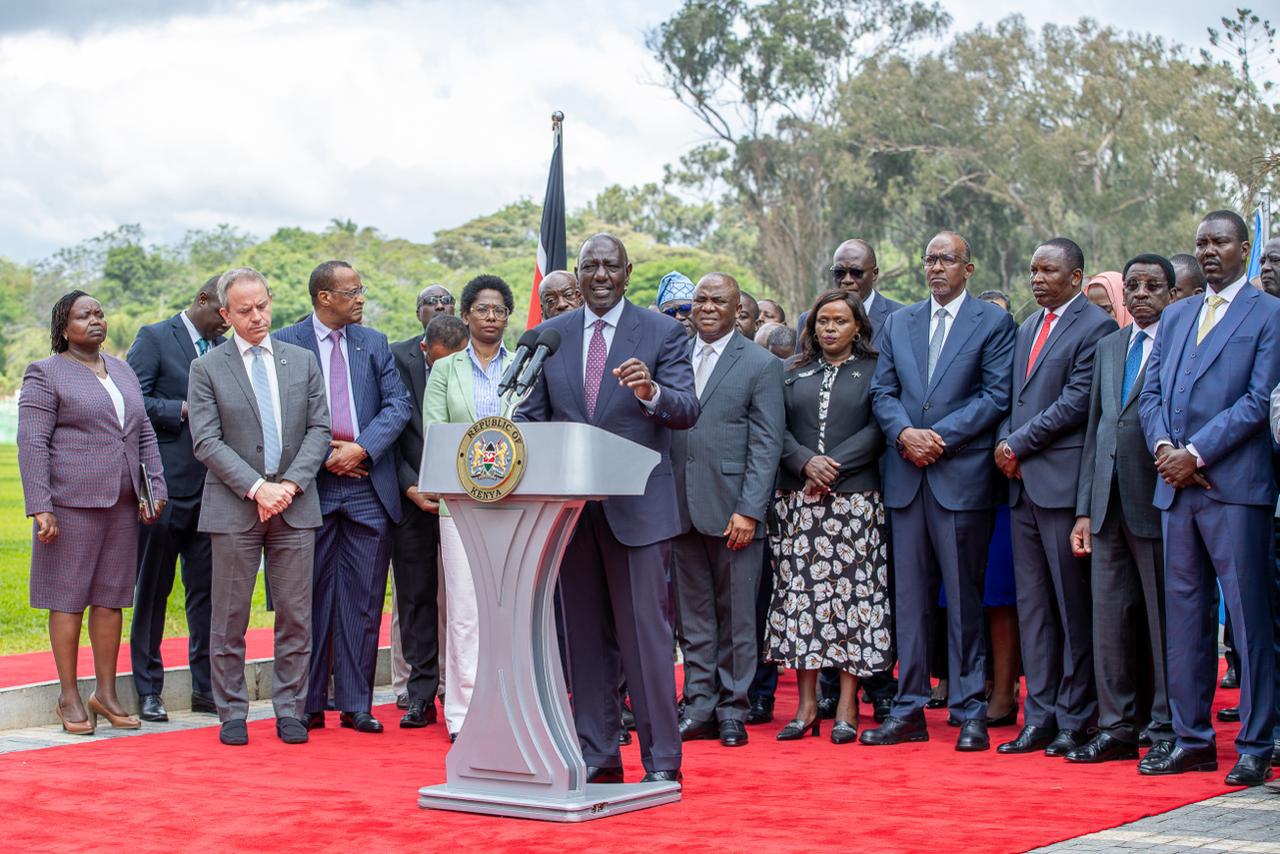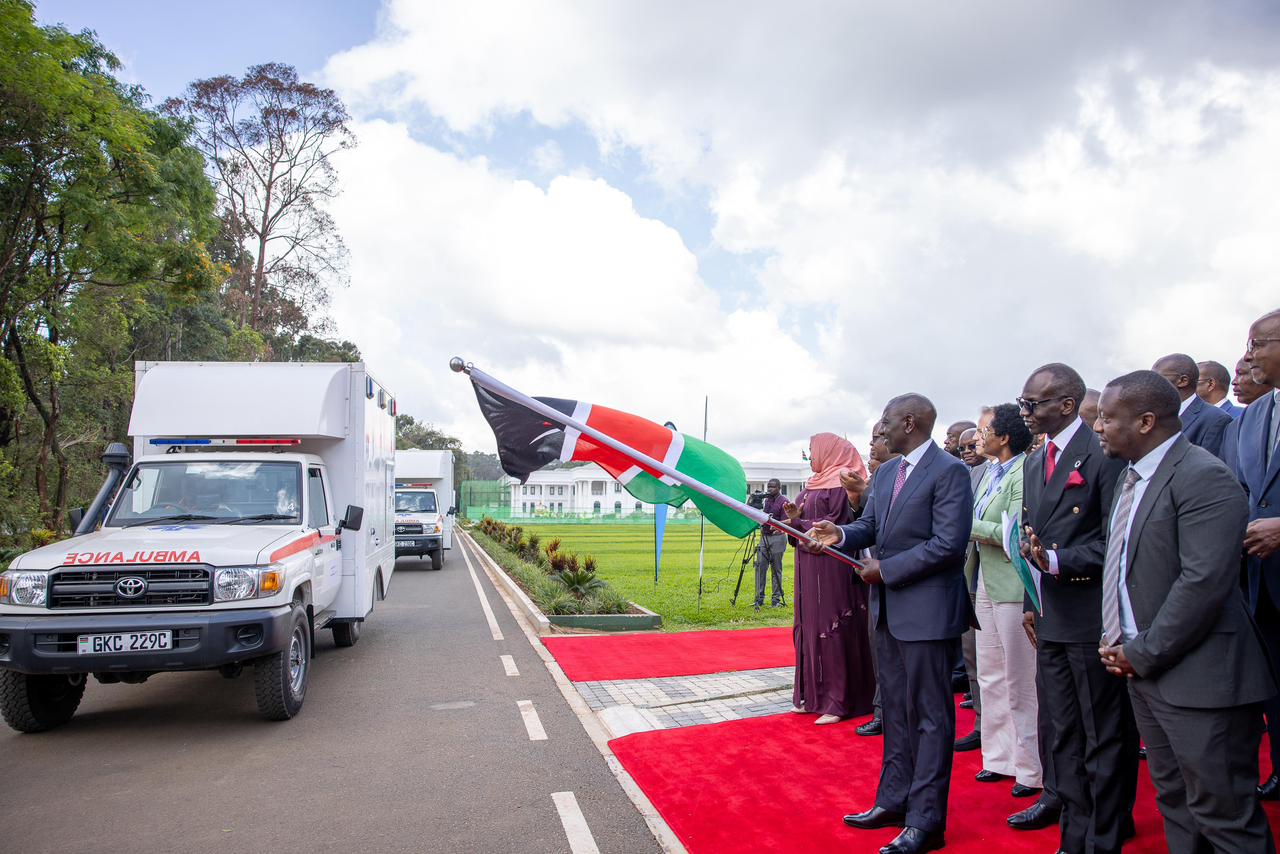
President William Ruto has reiterated Kenya’s unwavering commitment to universal health coverage, emphasising that “every life matters”.
Speaking during a handover of emergency medical equipment from the World Health Organisation (WHO), Ruto highlighted Kenya’s sustained collaboration with the agency in managing outbreaks, pandemics, and recovery efforts.
WHO donated 14 advanced life support ambulances, 223 oxygen cylinders, and essential medical supplies that will be integrated into the national referral system under the Social Health Authority.
The ambulances will serve all seven national referral hospitals and the National Emergency Response Centre, while select counties, including Elgeyo-Marakwet, Marsabit, Siaya, Samburu, and Tana River, will receive similar vehicles to support maternal and reproductive health services.
President Ruto noted that this support is a cornerstone of the country’s universal health coverage agenda, aimed at advancing safe pregnancies, healthy mothers, thriving newborns, and responsive health systems.
“The true value of these resources will be measured not in numbers, but in lives saved, babies supported, and communities strengthened,” he said, adding that maternal and newborn mortality remains unacceptably high in the country.
To accelerate improvements, the Ministry of Health has been directed to implement real-time reporting of cases, clinical audits, and immediate corrective measures at the facility and county levels.
The government is intensifying the Every Woman, Every Newborn, Everywhere initiative by equipping frontline teams, securing essential commodities, and enforcing respectful, high-quality care across all levels of the health system.
He also called on the WHO Africa Regional Office and other partners to scale up interventions to strengthen regional health security.
Ruto urged the WHO to expedite the operationalisation of the Regional Emergencies and Logistics Hub in Kenya, noting that the Ministry of Health is addressing regulatory and logistical bottlenecks as a top priority.

Kenya’s commitment to UHC is underpinned by six key pillars, including service delivery through 107,000 Community Health Promoters (CHPs), a motivated workforce with resolved arrears and improved terms, the rollout of the Integrated Health Management Information System, and SHA, which now covers over 27 million Kenyans.
Other pillars include reliable access to medical products through KEMSA and strong governance supported by transformative laws enacted in 2023.
“Universal health coverage is now a reality for more Kenyans than ever,” Ruto said.
He acknowledged the continued support of the WHO under the leadership of Regional Director Mohamed Janabi.
He stressed that strong partnerships, backed by government commitment and regional collaboration, remain essential to safeguarding lives, improving health outcomes, and achieving sustainable healthcare for all.
Janabi, on his part, stressed the importance of preventive care.
Health Cabinet Secretary Aden Duale said the ambulances are mainly geared at reducing maternal and child mortality rate in our country
“I want to commit to you, Your Excellency, that my team and the council of governors under the UHC that we are implementing as a country, we will do what it takes to ensure no mother dies,” said Duale.
He said it was not only unconstitutional but also immoral for a mother who walks to a health facility as a patient to give birth to another living being to lose her life
“I want to commit to you that those of us you have entrusted the leadership with, we will not let the people of Kenya down and we will not let you down,” he added.
Marsabit Governor Mohammud said the ambulances will go a long way in complementing what the counties and the national government has been doing.
Part of the donation also included 205 medical oxygen cylinders and 6.5 million tablets to support mass treatment of schistosomiasis and soil-transmitted diseases in 15 counties, and a comprehensive package of 952 items of reproductive and maternal health equipment, commodities and training modules designed to improve family planning was also among the items.

















